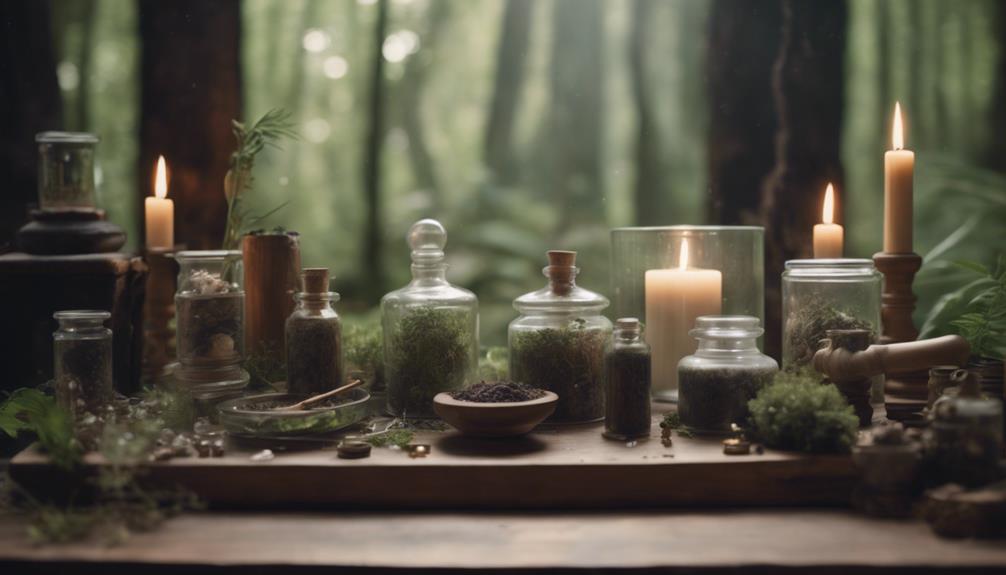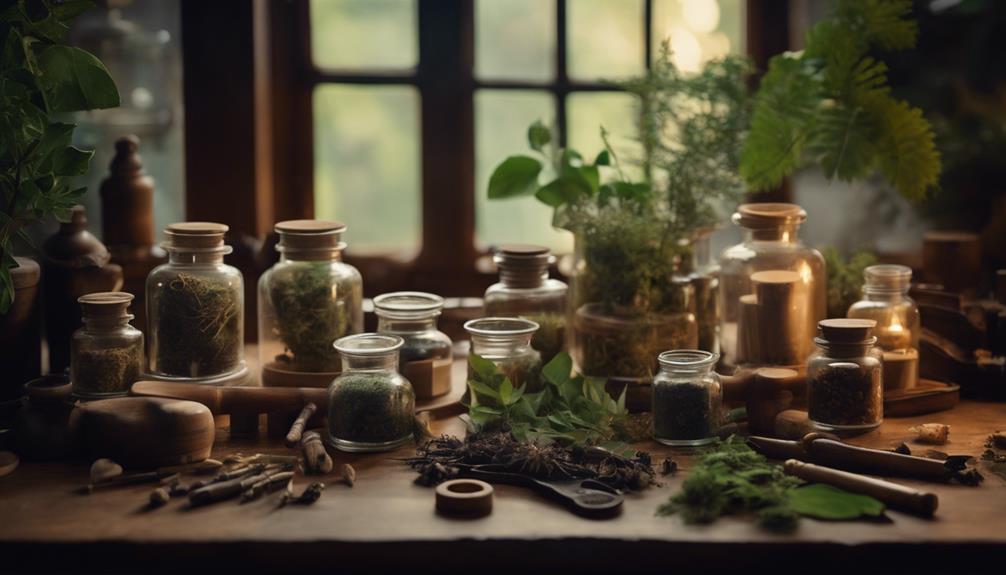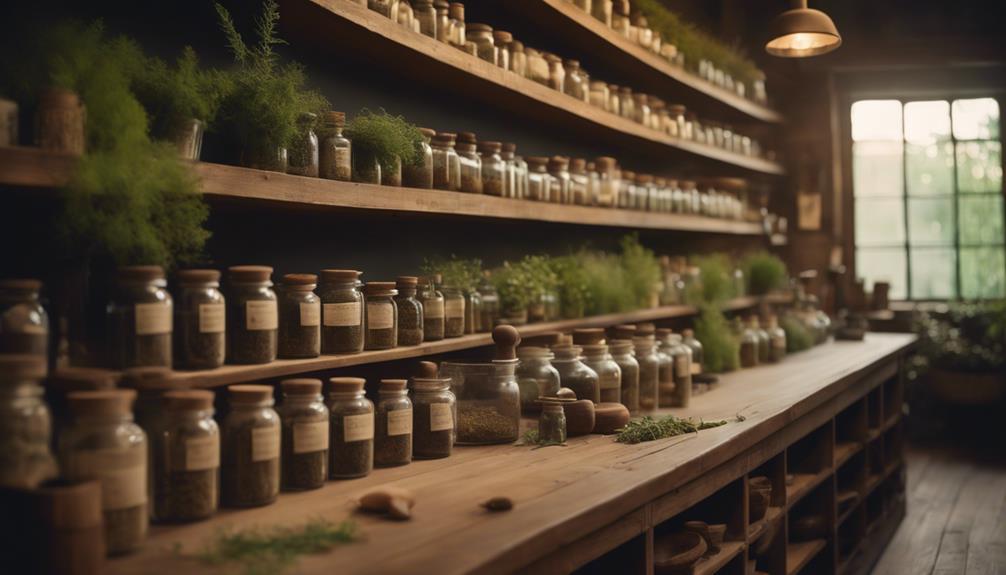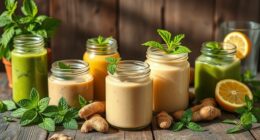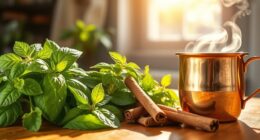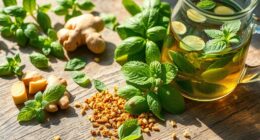With an herbalism degree, we can pursue a wide range of fulfilling careers that align with our passions, from clinical herbalism and herbal product development to education, writing, and research. We can explore roles like medicine making, herb growing, and herbal marketing, or specialize in niches like herbal product formulation or herbal education. Our skills can be applied to various industries, from culinary arts to pharmaceuticals, and we can create our own businesses or work for established companies. From herbal remedies to skincare products, the possibilities are vast, and as we continue, we'll uncover even more ways to turn our passion for herbalism into a successful and rewarding career.
Key Takeaways
• Pursue careers as clinical herbalists, medicine makers, herb growers, herbal writers, or herbal educators with a degree in herbalism.
• Specialize in niches like herbal product formulation, mutual aid/activism, or herbal education to diversify career opportunities.
• Create herbal remedies, skincare products, or herbal teas for unique markets, combining passion and skills in herbalism.
• Take on roles in herbal pharmacy, retail, or herbal research, leveraging the versatility of an herbalism degree.
• Earn a lucrative income ranging from $30 to $120 per hour as an herbal educator, writer, or consultant, depending on the chosen career path.
Exploring Herbalism Career Paths
With a degree in herbalism, we can pursue a wide range of careers that align with our passions and skills. As herbalism students, we're often drawn to careers that combine our love for nature, wellness, and helping others.
Fortunately, the career opportunities in herbalism are diverse and rewarding. We can work as clinical herbalists, medicine makers, herb growers, or herbal writers, to name a few. We might also find careers in marketing for herbal companies, herbal pharmacy roles, retail positions, or even herbal research.
Additionally, we can explore culinary arts with an herbal focus, homesteading, teaching, or herbal consulting. As we consider our career options, we might specialize in niches like herbal product formulation, mutual aid/activism, or herbal education.
While certification and legalities in herbalism are important considerations, we're excited to explore the many Herbalist Career paths available to us. By studying herbalism, we open ourselves up to a world of possibilities, from clinical practice to product development, and we're enthusiastic to see where our Herbalism schools training takes us.
Herbalist Salary and Opportunities

As we explore the world of herbalism, we're naturally curious about the financial rewards of pursuing this career path.
We're about to uncover the salary ranges for various herbalist roles, from educators to clinical practitioners, and examine the opportunities that exist within this growing industry.
Herbalist Career Paths
We can pursue a variety of fulfilling career paths as herbalists, including clinical herbalist, medicine maker, herb grower, herbal writer, or herbal artist/photographer. These opportunities allow us to combine our passion for herbalism with our skills and interests.
As herbalists, we can specialize in niche areas to boost our earnings and create unique products or services. For instance, we can focus on creating herbal remedies for specific health conditions or develop skincare products using herbal extracts.
Here are three potential career paths for herbalists:
- Clinical Herbalist: We can work as clinical herbalists, providing consultations and creating customized herbal remedies for clients. With an average hourly rate of $50 to $100+, this career path offers lucrative opportunities.
- Herbal Business Owner: We can start our own herbal businesses, creating and selling herbal products, such as teas, tinctures, or skincare products, online or in local stores.
- Herbal Educator: We can share our knowledge by teaching herbalism courses, leading workshops, or writing herbalism books and articles, inspiring others to become herbalists.
Herbal Industry Outlook
Our earning potential as herbalists is substantial, with salaries varying widely depending on our career choices and areas of expertise.
In the herbal industry, we can capitalize on our herbal knowledge to secure lucrative job opportunities.
As clinical herbalists, we can earn $50 to $100+ per hour, with potential annual earnings ranging from $20,000 to $120,000.
Alternatively, we can pursue careers as herbal educators, making $30 to $120 per hour, with rates increasing based on recognition and expertise.
Those with a green thumb can grow medicinal herbs, earning $15 to $30 per hour, depending on knowledge and skill level.
Running an herbal products business can also yield $20 to $50 per hour, influenced by marketing strategies and niche focus.
Average herbalist salaries vary based on career choice, skill set, and location, with opportunities in clinical practice, education, product creation, and retail.
With a strong foundation in herbal knowledge, we can thrive in this growing industry, where job opportunities abound and our earning potential is substantial.
Herbal Careers and Specializations
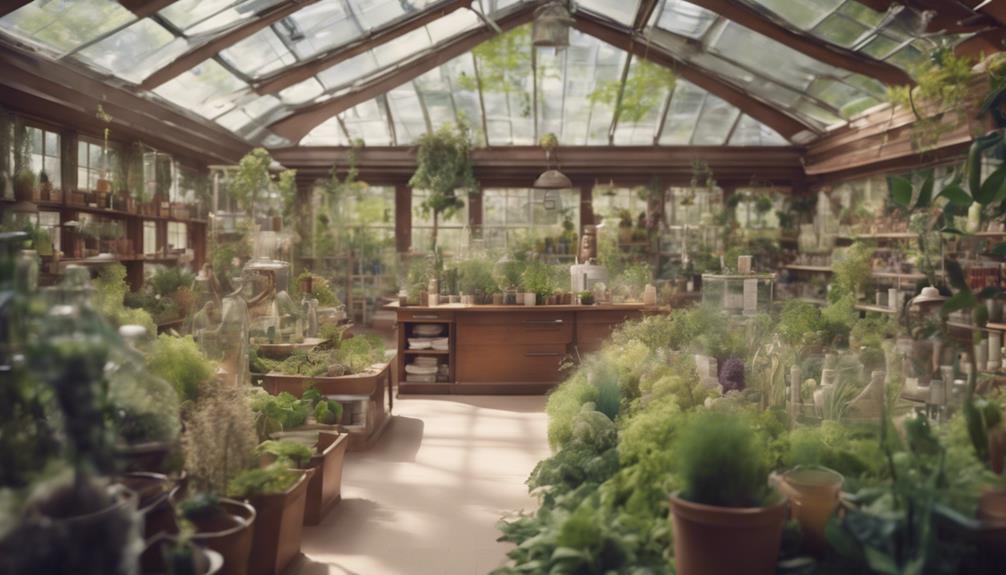
With a herbalism degree in hand, we can explore a diverse range of career paths and specializations that align with our passions and skills. As herbalism degree holders, we can pursue careers as clinical herbalists, medicine makers, herb growers/farmers, herbal writers, and more.
We can specialize in niche areas like herbal products without alcohol, tailored herbal blends, or specific health conditions, leading to higher earnings and market recognition.
Here are just a few examples of the many career paths we can take:
- Clinical Herbalist: Work one-on-one with clients to create personalized herbal remedies and treatment plans.
- Herbal Product Business Owners: Develop and sell herbal products, such as teas, tinctures, and salves, online or in-store.
- Herbal Educators: Teach herbalism classes, workshops, and online courses, sharing our knowledge with others.
As herbalists, we can earn a range of salaries, from $20,000 to $120,000 annually, depending on our specialization and experience. With the freedom to choose our own path, we can create a fulfilling and successful career in herbalism.
Clinical Herbalism and Therapy
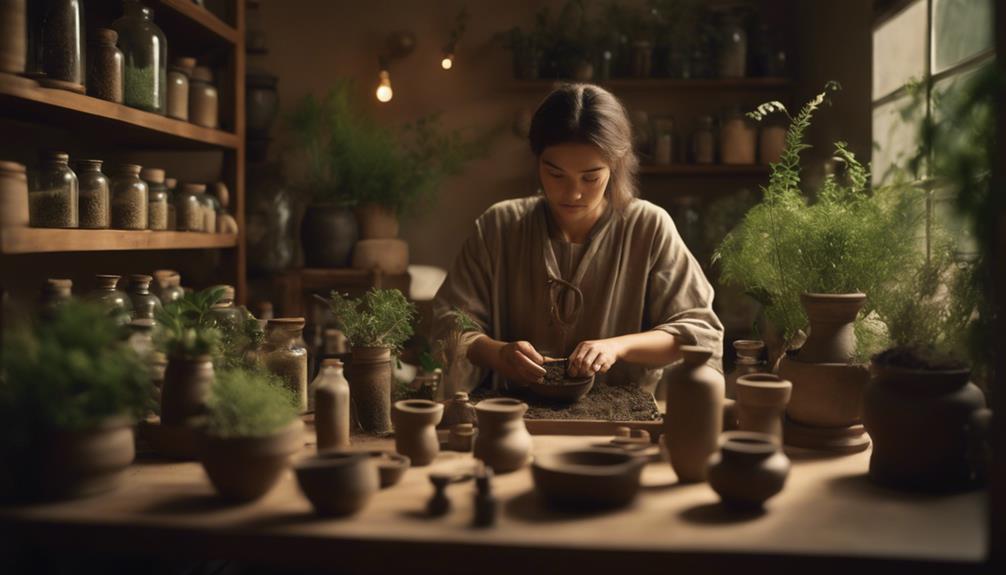
As clinical herbalists, we take a holistic approach to health, working closely with clients to craft personalized treatment plans that address the root causes of their ailments.
We create private practices, offering one-on-one consultations to individuals seeking natural health solutions.
Some of us take our services on the road, setting up mobile clinics and herbal pop-ups to reach under-served communities in need of accessible health care.
We also partner with community clinics to provide affordable herbal care to those who need it most.
In our practices, we combine herbal medicine making with other healing modalities like nutrition and lifestyle counseling to provide thorough care.
As clinical herbalists, we're trained in herbal first aid and remedy preparation, empowering our clients to take control of their health.
With experience and a strong client base, we can earn $50 to $100+ per hour.
Herbal Product Development and Sales

As we explore the domain of herbal product development and sales, we're going to examine the vital aspects of formulation and manufacturing, as well as strategies for product line expansion.
This involves creating unique blends and products that cater to specific niches, such as organic or vegan markets.
Formulation and Manufacturing
We can turn our passion for herbalism into a lucrative business by developing and manufacturing our own herbal products for sale. With a degree in herbalism, we can specialize in formulating and manufacturing herbal products that cater to various health needs and preferences. This expertise can lead to lucrative opportunities in the herbal product industry, where there's a growing demand for natural remedies.
Here are some ways we can utilize our skills in formulation and manufacturing:
- Develop unique herbal formulations that address specific health concerns, such as stress relief or immune system support.
- Create our own herbal product lines, offering a range of products that showcase our expertise in herbalism.
- Work with established herbal companies, contributing our skills in product development to help them expand their product lines.
Product Line Expansion
By developing our own herbal product lines, we can turn our passion for herbalism into a thriving business, offering a range of unique remedies, teas, skincare products, or supplements that cater to specific health needs. With our expertise in herbalism, we can formulate high-quality, effective, and ethically sourced products that meet the growing demand for natural health solutions.
| Product Category | Product Examples | Target Market |
|---|---|---|
| Herbal Remedies | Tinctures, Salves, Capsules | Individuals seeking natural health solutions |
| Skincare Products | Face creams, Body lotions, Soaps | Consumers prioritizing natural skincare |
| Supplements | Vitamins, Minerals, Herbal Blends | Health-conscious individuals and athletes |
| Teas | Herbal Blends, Single-Herb Teas | Tea enthusiasts and those seeking natural wellness |
Education and Teaching Opportunities

With a herbalism degree in hand, we can share our passion for natural healing by teaching others about the wonders of medicinal plants. We can educate individuals on the benefits and uses of herbalism, empowering them to take control of their health and wellness.
In this domain of education and teaching opportunities, we can:
- Teach herbalism classes at wellness centers, schools, and community centers, providing a thorough understanding of herbal traditions and practices.
- Lead plant identification walks, offering hands-on experience in identifying and understanding the properties of medicinal plants in their natural habitats.
- Develop educational resources, creating tailored materials to specific conditions or life stages, providing accessible and valuable knowledge to those seeking natural healing solutions.
Through these opportunities, we can pass down valuable knowledge and skills to future generations interested in natural healing practices, ensuring the continuation of herbal traditions and the growth of the herbalism community.
Writing and Communication Careers

As we share our passion for herbalism through education and teaching, we can also leverage our expertise to craft compelling stories, visual content, and marketing strategies that promote the value of medicinal plants, extending our reach beyond the classroom.
In the field of writing and communication, herbalism degree holders can thrive as herbal writers, creating engaging content about plants, ingredients, and healing properties for books, blogs, and freelance opportunities.
Herbal artists and photographers capture the beauty of plants, creating botanical designs that enhance branding for herbal companies. Meanwhile, herbal marketing professionals use their in-depth knowledge of herbal products to craft unique content, boosting marketing efforts for herbal companies.
As herbal educators, we can earn a lucrative income, with rates ranging from $30 to $120 per hour, depending on our recognition and expertise in the field. Through herbal communication, we play a crucial role in promoting herbal products, educating the public, and increasing the visibility of herbalism in various industries.
Herb Farming and Wildcrafting
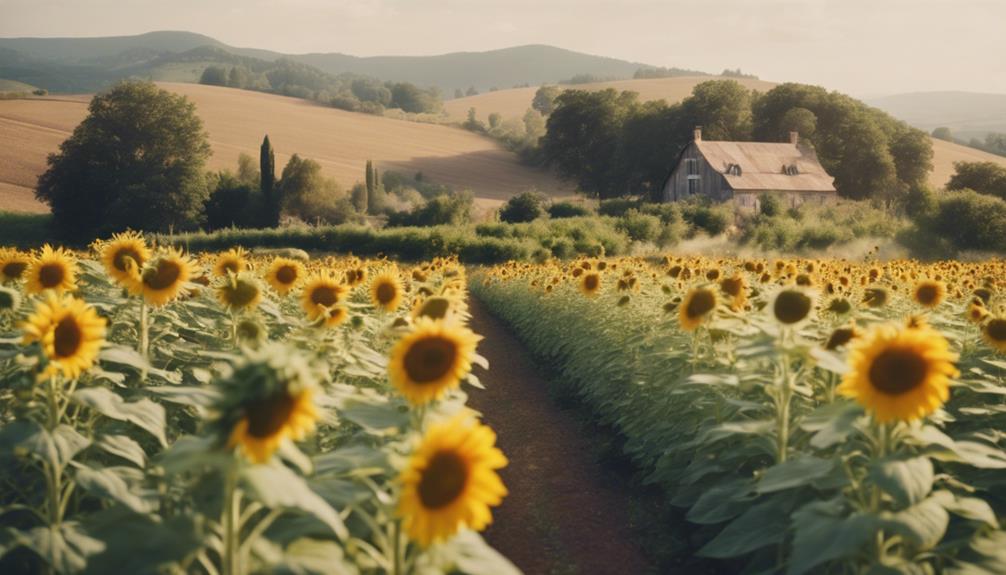
We cultivate medicinal plants on our own land or forage for wild ones, taking the first step towards creating a reliable supply of fresh, high-quality herbs for our herbal remedies. As herbalism degree holders, we've the opportunity to engage in herb farming and wildcrafting, two practices that contribute to the availability of locally sourced herbs.
- Through herb farming, we grow medicinal plants for personal use, product lines, or to supply local herbalists and health food stores.
- Meanwhile, wildcrafting allows us to ethically harvest wild medicinal plants for herbal preparations, ensuring sustainability and preservation of wild plant populations.
- By adopting ethical practices in both herb farming and wildcrafting, we can guarantee a consistent supply of high-quality herbs for our herbal remedies.
Incorporating these practices into our work allows us to take control of our herbal supply chain, guaranteeing that our remedies are made with the freshest and highest-quality ingredients available. By doing so, we can provide better services to our clients and contribute to the growth of the herbalism industry.
Research and Science Opportunities

Pursuing research opportunities in plant medicine, ethnobotany, or herbal product development enables us to explore the vast potential of herbalism. As herbalism degree holders, we can engage in scientific studies exploring the efficacy and safety of herbal remedies. We can collaborate with universities, research institutions, or botanical gardens on herbal research projects, contributing to the growing body of knowledge on traditional herbal medicine practices.
| Research Area | Description | Career Paths |
|---|---|---|
| Plant Medicine | Study the medicinal properties of plants | Pharmacognosy, Phytochemistry |
| Ethnobotany | Explore traditional uses of plants in different cultures | Ethnobotanist, Cultural Anthropologist |
| Herbal Product Development | Develop and test herbal products for the market | Product Development Manager, Regulatory Affairs Specialist |
Frequently Asked Questions
Can You Make a Career Out of Herbalism?
We often wonder, can you make a career out of herbalism? The answer is yes! With a growing demand for natural remedies and organic products, the herbalism job market is expanding.
From clinical herbalists to herbal writers, there are diverse career paths available. We can earn a good income, with clinical herbalists averaging $50 to $100+ per hour.
Do Herbalists Make a Lot of Money?
We've all heard the whispers: herbalists are broke, right? Not necessarily. While it's true some herbalists may not rake it in, many can earn a pretty penny.
Take clinical herbalists, for instance, who can bring in $50 to $100+ per hour. And let's not forget herbal educators, who can bank $30 to $120+ per hour.
The truth is, with the right skills and expertise, herbalists can do quite well for themselves financially.
Is a Herbalist a Real Job?
We're happy to set the record straight: yes, a herbalist is a real job! Herbalists are professionals who use natural herbs and plants to promote health. They diagnose patients, develop personalized herbal plans, and work as native healers, scientists, or holistic doctors.
While many herbalists are self-employed, they can also find opportunities in health facilities, wellness centers, or as consultants.
What Is the Career Outlook for a Herbalist?
As we gaze into the crystal ball of career prospects, we see a promising future for herbalists. With the growing demand for alternative medicine, we're witnessing a surge in job opportunities.
While the market is relatively small, it's ripe for growth. According to the American Herbalists Guild, various career paths beckon, from working in modern health facilities to self-employment and entrepreneurship.
With the right skills and knowledge, we can harness the potential for a thriving career in herbalism.
Conclusion
As we weave together the threads of herbalism, a vibrant tapestry of career paths unfolds. From therapeutic practitioners to product developers, educators to farmers, the possibilities are as diverse as the plants themselves.
As we cultivate our knowledge and passion for herbalism, we become the guardians of a timeless tradition, nurturing a healthier, more sustainable future. With every step, we bridge the gap between ancient wisdom and modern innovation, illuminating the boundless potential of this ancient art.

